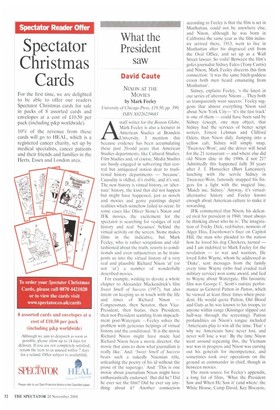What the President saw
David Caute
NIXON AT THE MOVIES by Mark Feeley University of Chicago Press, 119,50, pp. 399, ISBN X0226239683 Astaff writer for the Boston Globe, Mark Feeley is also a lecturer in American Studies at Brandeis University. I mention this because evidence has been accumulating these past 20-odd years that American Studies departments, like Cultural Studies, Film Studies and, of course, Media Studies are busily engaged in subverting that central but antiquated notion dear to traditional history departments — 'because'. Causality is oldhat, it's risible, and it's Out. The new history is virtual history, or 'alternate' history, the kind that did not happen but might have happened, just as novels and movies and genre paintings depict realities which somehow failed to occur, In some cases like Oliver Stone's Nixon and JFK movies, the excitement for the spectator is searching for vestiges of real history and real becauses' behind the virtual activity on the screen. Stone makes films in the indicative, but Mark Feeley, who is rather scrupulous and oldfashioned about the truth, resorts to conditionals and even subjunctives as he transports us into the virtual history of a very real and plausible Richard Nixon 'at' (or not 'at') a number of wonderfully described movies.
For example, wishing to devote a whole chapter to Alexander Mackendrick's film Sweet Smell of Success (1957), hut also intent on keeping us in touch with the life and times of Richard Nixon — Congressman, then Senator, then VicePresident, then hiatus, then President, then not-President scuttling from impeach ment post-Watergate Feeley solves the problem with generous helpings of virtual history and the conditional. 'It is the movie Richard Nixon might have made had Richard Nixon been a movie director: the movie that aims to show what journalism is really like,' And: 'Sweet Smell of Success bears such a nakedly Nixonian title, unleashing the poetry of his id without the prose of the superego.' And: 'This is one movie about journalism Nixon might have enthusiastically endorsed.' But did he? Did he ever see the film? Did he ever say anything about it? Another connection
according to Feeley is that the film is set in Manhattan, could not be anywhere else, and Nixon, although he was born in California the same year as the film industry arrived there, 1913, went to live in Manhattan after his disgraced exit from the Oval Office, and set up as a Wall Street lawyer. So voila! Between the film's gofer journalist Sidney Falco (Tony Curtis) and Nixon, Mark Feeley discerns this firm connection: 'it was the same bitch-goddess croon both men heard emanating from Manhattan'.
Sidney, explains Feeley, 's the latest in our series of alternate Nixons ... They both so transparently want success.' Feeley suggests that almost everything Nixon said about New York City— 'it's the fast track' is one of them — could have been said by Sidney (except, one may object, that Sidney had the services of better script writers, Ernest Lehman and Clifford Odets, than Nixon did). Jumping into a yellow cab, Sidney will simply snap, `Twen-tee-Won', and the driver will head for the 21 restaurant — and where else did old Nixon dine in the 1980s if not 21? Admittedly this happened fully 30 years after J. J. Hunsecker (Burt Lancaster), lunching with the servile Sidney in Twen-tee-Won, famously snapped his fingers for a light with the magical line, 'Match me, Sidney.' Anyway, it's virtualalternative history and Feeley knows enough about American culture to make it rewarding.
JFK commented that Nixon, his defeated rival for president in 1960, 'must always be thinking about who he is'. The imagination of Tricky Dick, red-baiter, nemesis of Alger Hiss, Eisenhower's fixer on Capitol Hill, the man who pleaded to the nation how he loved his dog Checkers, turned — and I am indebted to Mark Feeley for the revelation — to war and warriors. He loved John Wayne, whom he addressed as 'Duke', sent messages from the family every time Wayne (who had evaded real military service) won some award, and lied to Wayne about Watergate. His favourite film was George C. Scott's outsize performance as General Patton in Patton, which he viewed at least three times when president. He would quote Patton, Old Blood and Guts as he was known to his troops, to anyone within range (Kissinger slipped out half-way through the screening). Patton profundities on Nixon's tongue included 'Americans play to win all the time. That' s why we Americans have never lost, and never will lose a war.' By the time Nixon went around repeating this, the Vietnam war was in progress and Nixon was cursing out his generals for incompetence, and sometimes took over operations on the ground as commander in chief, though in between movies.
The main source for Feeley's appendix, a long list of films, 'What the President Saw and When He Saw it' (and where: the White House, Camp David, Key Biscayne,


























































































 Previous page
Previous page